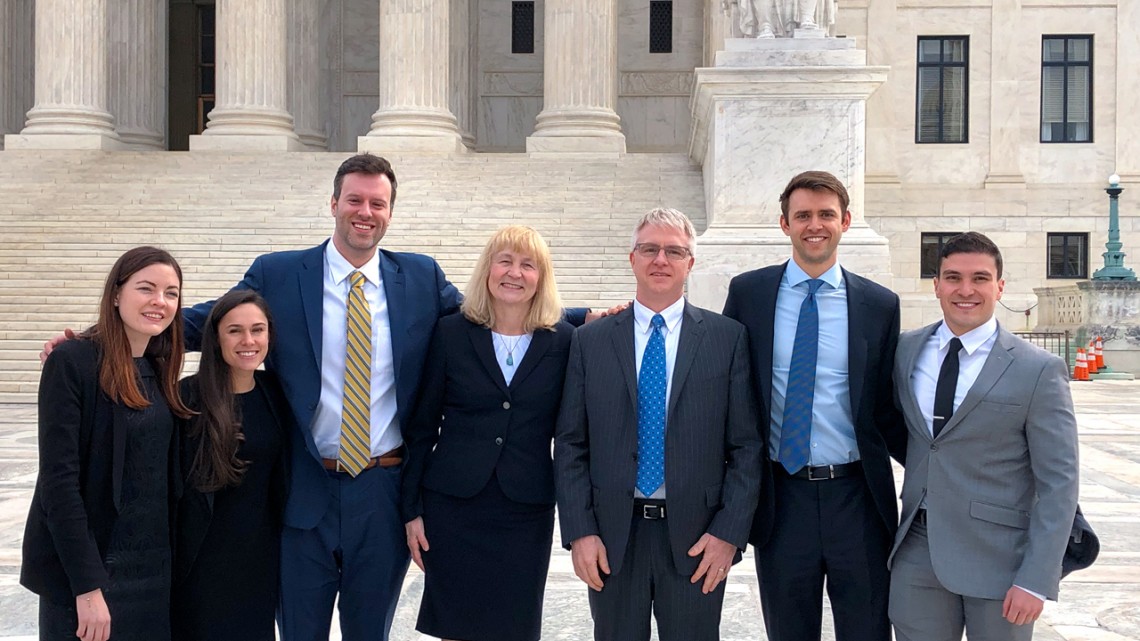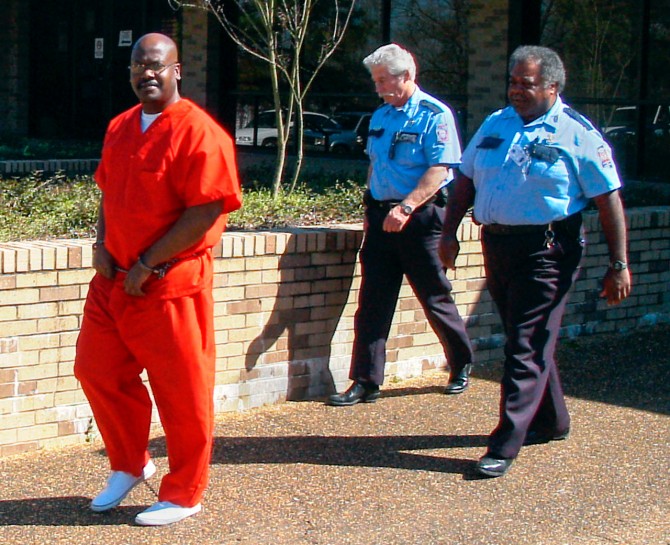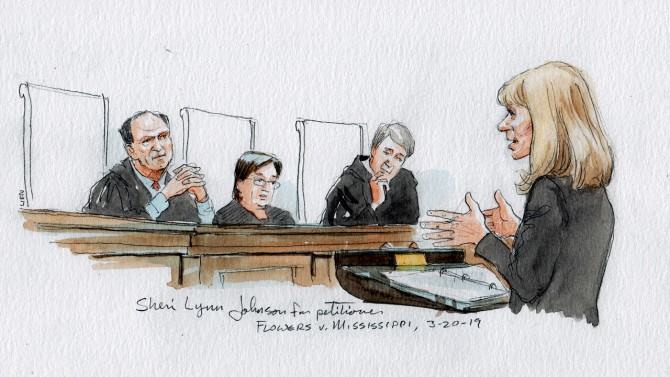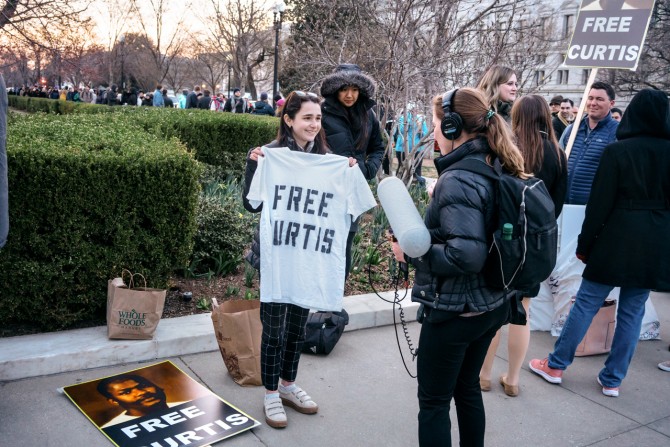
Cornell Law students and faculty celebrate the Supreme Court victory June 21. From left, McCahey Townsend, J.D. ’18; Nicole Palmadesso ’05, J.D. ’18; Alex Bransford, J.S.D. ’19; Professor Sheri Lynn Johnson; Professor Keir Weyble; Sam Macomber, J.D. ’20; and Pablo Chapablanco, J.D. ’19.
How Cornell Law earned a Supreme Court victory
By Sherrie Negrea
On the morning of July 16, 1996, four employees of the Tardy Furniture store in downtown Winona, Mississippi, were shot in the head, their bodies left sprawled on the floor or slumped over the counter.
Seven months later, Curtis Flowers, an employee who had been fired from the store two weeks before the murders, was arrested and charged with the quadruple homicide. Flowers, 26 at the time, had no criminal record, and no forensic evidence linked him to the killings.
Yet six times over the next 14 years, the Montgomery County prosecutor, Doug Evans, tried Flowers, an African American who had grown up in Winona. The first three trials ended with a conviction and death sentence but were overturned by the Mississippi Supreme Court because of prosecutorial misconduct or because prospective jurors had been excluded based on their race. The next two were mistrials. In the sixth trial, Flowers was again convicted and sentenced to death.
Flowers wanted to appeal, and two Cornell Law School professors – Sheri Lynn Johnson and Keir Weyble – agreed to take over the case. Working with two students from the Law School’s capital punishment clinic, they took the case to the U.S. Supreme Court. On June 21, 2019, in a 7–2 decision, the court overturned the conviction. The justices concluded that Evans had violated the U.S. Constitution by repeatedly excluding African Americans during jury selection, using what is known as peremptory challenges.
While Flowers is still imprisoned and may face a seventh trial in Mississippi, the Supreme Court decision will have a significant impact on future cases dealing with racial bias in the selection of jurors, said John Blume, the Samuel F. Leibowitz Professor of Trial Techniques and director of the Cornell Death Penalty Project. “I think the court,” Blume said, “is trying to send a message: ‘Don’t do this. … Don’t cheat to win.’”
The right people
The Flowers case landed at Cornell when David Voisin, a Mississippi lawyer, asked Johnson and Weyble to handle Flowers’ appeal. In the close-knit network of capital defense lawyers, Cornell Law is well known as one of fewer than 10 law schools nationwide that offer a capital punishment clinic fully staffed by faculty.
“I think it’s very hard to pull off,” said Eduardo M. Peñalver ’94, the Allan R. Tessler Dean and Professor of Law. “You have to have the right people, and they have to have a profile within death penalty advocacy to maintain a flow of cases through the law school. And that requires exceptional commitment on their part.”
Johnson, the James and Mark Flanagan Professor of Law, is a renowned expert on the interface of race and criminal procedure. And Weyble, clinical professor of law, is a nationally known expert in post-conviction litigation and has represented prisoners in capital cases across the South for more than 20 years.
Both were attracted to the case because of its focus on racial issues in jury selection and the sheer number of trials involved. “I’d never encountered another case that went to trial six times,” Weyble said. “That alone made my ears perk up.”
As they began researching the case, they found overwhelming evidence of racial discrimination: Out of the 43 African Americans in the jury pool for Flowers’ six trials, Evans rejected 41. And in the sixth trial, he struck five of six.
And he had questioned the potential jurors differently, depending on their race. In the last trial, Evans asked each rejected black prospective juror 29 questions, while asking each seated white juror just one.
“The numbers are extraordinary,” Johnson said. “For whatever reason, Evans wanted a white jury and did whatever he could to get his white jury.”
They also found Evans used weak evidence in the case. For example, one witness could only identify the perpetrator as being African American and initially named someone else as the suspect, Johnson said.
“He only [identified] Mr. Flowers after there were various suggestive comments made,” Johnson said. “So a variety of factors made this an unreliable identification and in our view should have meant that the identification should not have gone to the jury at all.”
When the Mississippi Supreme Court reaffirmed Flowers’ conviction in his sixth trial, Johnson and Weyble appealed to the U.S. Supreme Court. But the court sent the case back to the lower court.
The justices asked the Mississippi Supreme Court to reconsider the case in light of the U.S. Supreme Court’s 2016 decision in Foster v. Chatman, which overturned the conviction of a Georgia death-row inmate after he obtained documents showing that prosecutors had highlighted the race of prospective black jurors and written “definite NO!” or “No Black church” after their names.
The Mississippi Supreme Court, however, did not find Foster relevant to Flowers’ conviction. “They pasted in their previous opinion that ignored the prosecutor’s history,” Johnson said. “They pasted it in word for word.”
That prompted Johnson and Weyble to appeal again.
A second appeal to the Supreme Court
As they prepared their second appeal to the U.S. Supreme Court, Johnson and Weyble enlisted Pablo Chapablanco, J.D. ’19, and Sam Macomber, J.D. ’20, students in the school’s capital punishment clinic. During the fall and spring of 2018-19, Chapablanco and Macomber worked late into the night, poring over the jury selection records and preparing a 600-page research document that would become an essential part of the arguments made to the Supreme Court. “They did extraordinary work on behalf of Curtis Flowers,” Johnson said.
Chapablanco, now a clerk for a U.S. district court judge in El Paso, Texas, remembers being pessimistic that the Supreme Court would review the case. Each term, it receives as many as 8,000 new cases and selects only about 80 of them to review with oral argument.
But he changed his mind when American Public Media began airing a series on the case, on the podcast “In the Dark.” “When we started listening to the podcast and people started to say how good it was and how it was going to win an award, that’s when we realized that we’re going to be in the spotlight and the work we’re doing is actually going to be scrutinized,” Chapablanco said. “It was just a huge help because it opened up a lot of possibilities for us.”
When the team filed its petition to the Supreme Court, it focused on a single issue: whether the prosecutor deliberately used race to exclude prospective jurors in the sixth trial. They pointed to the Supreme Court’s 1986 decision in Batson v. Kentucky, where it ruled that prosecutors may not exclude jurors solely on the basis of race because it violates the 14th Amendment.
They also pointed to another hallmark of racial discrimination in jury selection: questioning potential jurors differently. While Evans asked both African Americans and whites about their relationships to Flowers and witnesses in the case, he asked only prospective African American jurors details about those relationships.
“The prosecutor dug very deep to find those potential biases in the jurors, but he did not ask those probing questions of white potential jurors,” said Macomber. “So the whole point was the prosecutor was striking jurors and giving some reason, and that was a pretext for race.”
On Nov. 2, 2018 – five months after the legal team had filed its petition – the Supreme Court agreed to hear Flowers’ appeal. The team had 40 business days to file the brief on the case.
While they had accumulated a set of written arguments over their six years of work on the case, preparing a brief for the Supreme Court “requires a deeper dive” on the key issues, Weyble said. They started a new brief from scratch.
“That takes a huge amount of time, especially in a case like this where so much turns on granular factual detail.”
On Dec. 27, 2018, the team filed the brief, and began waiting for its day in court.
Supreme Court hearing
The line outside the Supreme Court steps began snaking around the block at 3 a.m. March 20, as hundreds of people waited for a seat at the oral argument.
At 10:06 a.m., Johnson began presenting her argument, focusing on the issue of racial bias. “The only plausible interpretation of all of the evidence viewed cumulatively is that Doug Evans began jury selection in Flowers VI with an unconstitutional end in mind, to seat as few African American jurors as he could,” she said.
Associate Justice Samuel A. Alito Jr. asked Johnson if she thought she would have a chance of winning the case solely on the basis of the striking of African American jurors in the sixth trial, without the history of the previous trials.
Said Johnson: “The evidence still is clear and convincing that Mr. Evans acted with discriminatory motivation in this case, even if we set aside his history … .”
Later, another answer to Alito’s question came from an unlikely corner of the court: Associate Justice Brett Kavanaugh. In a remark to the opposing lawyer, Kavanaugh said, “We can’t take the history out of the case.”
Over the course of the hourlong hearing, the questions from Kavanaugh and Alito surprised Johnson the most. “They’re very conservative justices, and so I would not have expected them to be sympathetic to any claim of a criminal defendant,” she said.
Before the hearing was over, Weyble said it was apparent that the decision would turn in their favor. “It seemed pretty clear early on in the argument that the court understood what was going on in the case,” he said.
The decision
When the decision was announced last June, neither Weyble nor Johnson was surprised that Kavanaugh had written it. In his 31-page decision, he wrote, “In sum, the state’s pattern of striking black prospective jurors persisted from Flowers’ first trial through Flowers’ sixth trial.” He concluded that “we break no new legal ground. We simply enforce and reinforce Batson by applying it to the extraordinary facts of this case.”
The Supreme Court sent the case back to Mississippi Supreme Court for “further proceedings”; the decision of whether to release Flowers or to try him yet again lies with Evans, the prosecutor. Evans hasn’t said whether he will try Flowers again but has stated he remains convinced Flowers is guilty.
If he does try Flowers again, however, he will have fewer witnesses to prove his case. In the past two years, a jailhouse informant who claimed that Flowers had confessed and a woman who claimed that she saw Flowers running from the murder scene have recanted their testimony.
“The case has certainly gotten much weaker in the nine years since it was tried last,” said Weyble, who, like Johnson, believes Flowers is innocent. “If I were a prosecutor, I would think pretty seriously about whether I’m just going to embarrass myself by trying this case again.”
The Supreme Court decision reaffirmed Cornell Law faculty’s commitment to representing death-penalty inmates, Peñalver said.
“There’s a lot of commentary … that law schools are out of touch and not engaged with the profession,” he said. “Cornell’s distinction is that we can theorize and produce scholarship with the best of them, but also our most academically inclined scholars are deeply respectful of practice. That’s something that all of the members of the community – current students, alumni and faculty – can take pride in.”
Sherrie Negrea is a freelance writer.
A version of this article originally appeared in the fall 2019 issue of Cornell Law School’s Forum magazine.
Media Contact
Get Cornell news delivered right to your inbox.
Subscribe



